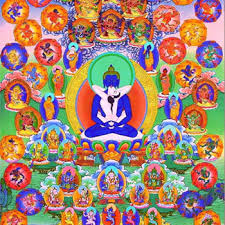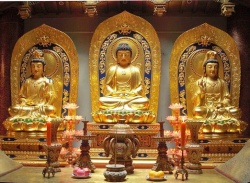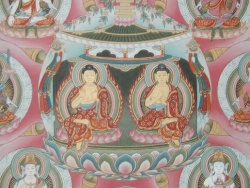Guhyagarbha tantra
Guhyagarbha Tantra (Skt.; Tib. རྒྱུད་གསང་བ་སྙིང་པོ་, Gyü Sangwé Nyingpo; Wyl. rgyud gsang ba'i snying po), The Essence of Secrets Tantra is the main tantra of the Mahayoga.
It contains twenty-two chapters.[1]
Khenpo Namdrol writes: "Among the distinctions within Mahayoga, namely the great accomplishment
pratices of the eight herukas and the eighteen classes of the great tantras, this Secret Essence Tantra extracts the essence of them all, as well as being the general tantra of enlightened mind.
The twenty-two chapters of this tantra afford an explanation of the three tantras of the ground, path and result and, within the context of the tantra of the path, the ten topics of tantra."[2]
Title
Its fuller title is the Glorious Web of Magical Illusion, The Secret Essence Definitive Nature Just As It Is
(Tib. Pal Gyutrül Drawa Sangwé Nyingpo De Kona Nyid Ngé Pa, Wyl. [[dpal sgyu 'phrul drva ba gsang ba'i snying
po de kho na nyid nges pa]]), which can itself be condensed to the alternative title of Tantra of the Web of Magical Illusion (Tib. Gyutrül Drawa Gyü, Wyl. sgyu 'phrul drva ba rgyud).
Commentarial Tradition
For centuries, detailed study of its root verses and many celebrated commentaries, including Longchenpa's Trilogy of Dispelling Darkness, Dodrupchen Jikmé Tenpé Nyima's Key to the Precious Treasury and [[Mipham
Rinpoche's]] Essence of Clear Light, has been the key to understanding the Vajrayana’s most prominent themes and practices, such as empowerment, samaya, mantra recitation and the use of mandalas.
In Tibet, two major commentarial traditions of this tantra have developed:
- the Zurpa tradition, based on the perspectives of Buddhaguhya, Vilasavajra, and other masters, which can be described as the vast, common tradition, and
- Rongzom Chökyi Zangpo and Longchenpa's tradition, based on the perspective of Suryaprabhasingha, which can be described as the profound, uncommon tradition.
Alternative Translations
The Guhyagarbha Tantra (The Tantra of the Secret Quintessence) is the main tantra of the Mahayoga class and the
primary Tantric text studied in the Nyingma tradition as a key to understanding empowerment, samaya, mantras, mandalas and other Vajrayana topics.
Traditionally higher tantras require an empowerment and transmission from a qualified guru or lama before they can be studied and practiced, and were therefore not usually discussed publicly.
Prahevajra (Garab Dorje) received the empowerment and transmission of the Mahayoga teachings of the Secret Matrix Tradition (Guhyagarbha tantra) from Mahasiddha Kukuraja.
Commentaries on the Guhyagarbha Tantra
- Vilāsavajra dpal gsang ba snying po’i ’grel pa rin po che’i spar khab slob dpon sgeg pa'i rdo rjes mdzad pa - "Blazing Palace".
- Vimalamitra (8th century)
- rdo rje sems dpa’i sgyu ’phrul dra ba’i rgyud dpal gsang ba’i snying po shes bya ba’i spyan ’grel pa "Eye Opening" Commentary on the Secret Essence P4756
- Rongzom Pandita, Chökyi Zangpo (1012–1088) (Tibetan: རྒྱུད་རྒྱལ་གསང་བ་སྙིང་པོ་དཀོན་ཅོག་འགྲེལ, Wylie: rgyud rgyal gsang ba snying po dkon cog 'brel)
- Longchenpa (1308–1363) mun sel skor gsum - "Trilogy of Dispelling Darkness" - Three commentaries on the Guhyagarbha Tantra:
- Minling Lochen Dharma Shri (1654–1718) -
- Mipham (1846–1912) gsang 'grel phyogs bcu'i mun sel gyi spyi don 'od gsal snying po/ - An exegesis of Longchenpa's commentary on the Guhyagarbha Tantra
- Dodrup Chen III, Jigme Tenpai Nyima (1865–1926) - dpal gsang ba’i snying po’i rgyud kyi spyi don nyung ngu’i ngag gis rnam par ’byed pa rin chen mdzod kyi lde mig "Key to the Precious Treasury" - A {General Commentary on the Guhyagarbha Tantra.
- Khenpo Shenga (1871–1927) - Annotated Commentary on the Guhyagarbha Tantra
Footnotes
- ↑ There are actually three distinct versions of the Guhyagarbha Tantra, respectively in twenty-two, forty-six and eighty-two chapters. The concise version in twenty-two chapters is the one which is most widely studied within the Nyingma tradition (Source: Gyurme Dorje, Guhyagarbha Tantra: Introduction, PhD.).
- ↑ Introduction to Ju Mipham Jampal Gyepa'i Dorje, (2010), p. 1.


